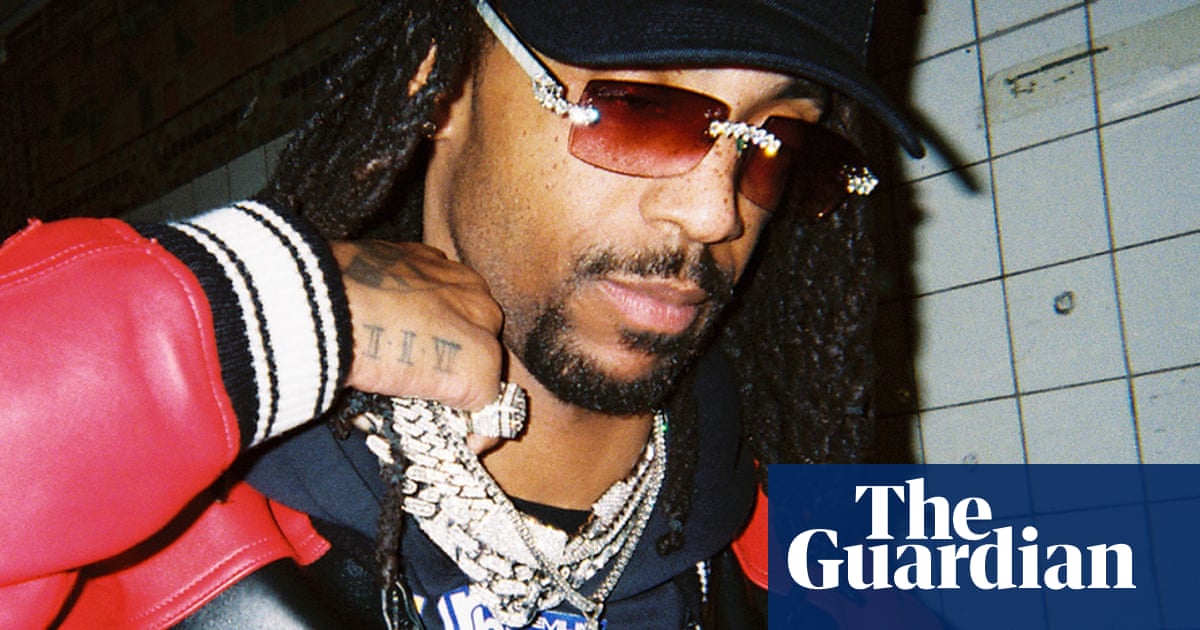In the brief window between my conversation withDetroitrapper Boldy James and you reading this sentence, it is likely that the 42-year-old MC will have surprise-released at least one new album on to streaming platforms. This year alone, he has already released seven records. A planned eighth is due in July, but who knows what might pop up in between.
“My father always told me you’ve gotta work twice as hard because you can’t expect something for nothing in this life!” Boldy says of a work rate that can easily result in 20 new songs being completed in the studio over a 24-hour period. His combative verses, as cutting and direct as Don Corleone whispering instructions to a made man, have earned him critical adoration and elicited high-profile co-signs from hip-hop figureheads including Earl Sweatshirt, Nas, Westside Gunn, the late Mac Miller and producer the Alchemist, while fans are intrigued to know how he remains so prolific.
Boldy calls his release strategy “flooding the market” – tactics he learned from his days caught up selling drugs on Detroit’s West Side. “My homie worked the track – which was a long stretch filled with junkies – from 3am to 6am. He might make $5,000 [£3,700] per night. It might have taken my dad a few months to earn that same cash, so I ended up doing it too. I’ve never been no sleepyhead. I used to sell drugs all night and then go to my class to take an exam. No problem.”
Boldy describes his days selling narcotics on cold street corners with vivid cinematic flair: on the spooky new trap song Aspen, he jokes that his “Mexican plug” – slang for a prestigious international drugs source – looks a lot like the late civil rights activist Cesar Chavez. Is that true? Boldy laughs: “Allegedly.” He looks back on this part of his life as a reflection of his resourcefulness. “I never just settled for the cards life was dealing me,” he says. “I’ve always been more like the dealer.”
A student of 1990s mafioso rap, a teenage Boldy fed off the confidence of artists such as the Notorious BIG and Erick Sermon. “I like it when men have firm handshakes and don’t whine too much,” he says. He started releasing music independently in the late 2000s, a sound built around warm nostalgia and sleepy depression. Boldy can be famously sedate in interviews, but today he’s lively and open.
He usually works with a single producer per record, giving his albums an unusual cohesiveness in a collaboration-heavy genre. Produced by Detroit “sound healer” Sterling Toles, the soul stirring spiritual jazz sermon of Mommy Dearest (A Eulogy), one of Boldy’s most experimental songs, reflects on a childhood of serious neglect due to a mother lost to addiction. “Tellin’ me that you was on your way to come see me / And left me sittin’ on the porch in the rain, freezing,” he raps amid stuttery saxophone that can’t decide if it wants to soar or whimper.
But when we talk, Boldy doesn’t want to reflect too much on that difficult past. It’s all in his music. He says his 2022 song Power Nap is among the finest examples of his lyricism. “We went from childhood dreams to federal nightmares” … “Six sleeper bags on the grass it’s a slumber party,” he raps, his vocals evoking those of Mobb Deep’s Prodigy as he burrows into unorthodox pockets of drumless soul-rap.
“On one level, six sleeping bags makes you reminisce on your childhood and having those sleepovers to play Nintendo with all your friends, right?” he asks. “But it’s also because I could easily roll up the street and see six young Black males on the grass, laid out dead. I represent the hood struggle for real. No gimmicks.”
Today, he cares most about showing his six children “the whole world,” he says. “I want to make sure I’m always sharing wisdom, because you can get took out at any moment. Right now I’m jumping out half a million dollar cars, wearing $400,000 [£300,000] worth of jewels. It means I’ve got a lot to lose.”
Testament to Boldy’s stature is the fact that he’s sitting on an unreleased collaborative album with J Dilla rumoured to be called Drug Dilla. Boldy has previously said that the late Detroit beatmaker’s estate had given him access to some of the last beats the producer ever crafted – putting him among the small group of MCs (Busta Rhymes, Ghostface Killah, MF Doom, Phat Kat) to get posthumous approval from his camp.
Boldy has said the album is finished, but I’m warned in advance not to ask about a release date. Yet he offers a telling answer on why his flow might fit so well over Dilla’s unconventional production. “I rap for real niggas who don’t care about club music. That’s more my lane. I got like a left-handed type of flow anyways, so not a lot of people can really bounce or groove to my shit. There’s a time and a place for my music.”
Asked what that is, Boldy concludes: “It’s music made for people trying to process their past and turn it into a net positive. Play it on a road trip while driving to visit family. But I don’t expect everybody to relate either … because not everybody grew up around money and murder.”
Boldy James and Nicholas Craven’s new single, Spider Webbing Windshields, is out now. An as-yet untitled album from the duo will be released in July
